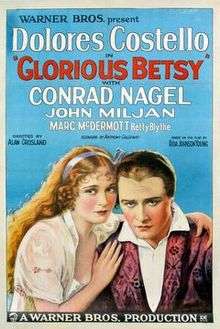Glorious Betsy
| Glorious Betsy | |
|---|---|
 1928 theatrical poster | |
| Directed by | |
| Screenplay by |
|
| Based on |
Glorious Betsy by Rida Johnson Young |
| Starring | |
| Cinematography | Hal Mohr |
| Edited by | Thomas Pratt |
Production company | |
| Distributed by | Warner Bros. Pictures |
Release dates |
|
Running time | 80 minutes (7-8 reels; 7,091 feet) |
| Country | United States |
| Language | Silent film (English intertitles & talking sequences) |
Glorious Betsy is a 1928 silent film with talking sequences. It is based on a play of the same name by Rida Johnson Young and starring Dolores Costello. It was produced by Warner Bros. and was nominated for (but did not win) an Academy Award for Best Writing, Adaptation in 1929. The film was directed by Alan Crosland with cinematography by Hal Mohr. A mute print of this film, minus its Vitaphone tracks, survives in the Library of Congress, and while their copy of this film is missing some of the sound reels, it is unknown whether other copies of the sound have been preserved elsewhere.[1][2][3][4][5]
Although the film was written by both Anthony Coldeway and Jack Jarmuth (the latter credited only for title cards), only Coldeway was nominated for the Academy Award.
Plot
The film is a semi-historical narrative and depicts the real-life courtship, marriage, and forced breakup of Jérôme Bonaparte, brother of Napoleon, and his wife from the American south, Elizabeth Patterson. Napoleon did not approve of the union (despite the fact that her family was one of the wealthiest in America) and the marriage was annulled. Jérôme was subsequently forced to marry Catharina of Württemberg. They had one child, depicted in the film, Jérôme Napoleon Bonaparte. In order to provide a "happy ending", Jérôme in the film leaves France to be with his wife. However, in historical fact he remained in Europe.
Cast
- Dolores Costello as Betsy Patterson
- Conrad Nagel as Jérôme Bonaparte
- John Miljan as Preston
- Marc McDermott as Colonel Patterson
- Pasquale Amato as Napoleon Bonaparte
- Michael Vavitch as Capt. St. Pierre
- Andrés de Segurola as Capt. Du Fresne
- Paul Panzer as The Ship's Captain
- Clarissa Selwynne as Aunt Mary
- Betty Blythe as Princess Frederick
Premiere Vitaphone short films
Glorious Betsy premiered at the Warners Theatre in New York City, New York on April 26, 1928.
| Title | Year |
|---|---|
| Marion Talley, Soprano, and Beniamino Gigli, Tenor, of the Metropolitan Opera Company, Singing "Verranno a te sull'aura" (Borne on the Sighing Breeze) from Act 1 of the Opera "Lucia di Lammermoor" | 1927 |
See also
References
- ↑ Glorious Betsy at silentera.com database
- ↑ The American Film Institute Catalog Feature Films: 1921-30 by The American Film Institute, c. 1971
- ↑ Catalog of Holdings The American Film Institute Collection and The United Artist Collection at The Library of Congress by The American Film Institute, c.1978
- ↑ The Library of Congress American Silent Feature Film Survival Catalog: Glorious Betsy
- ↑ 1957 MOVIES FROM AAP Warner Bros Features & Cartoons SALES BOOK DIRECTED AT TV
External links
- Glorious Betsy at the Internet Movie Database
- Glorious Betsy at SilentEra
- Glorious Betsy at AllMovie
- Poster of Glorious Betsy